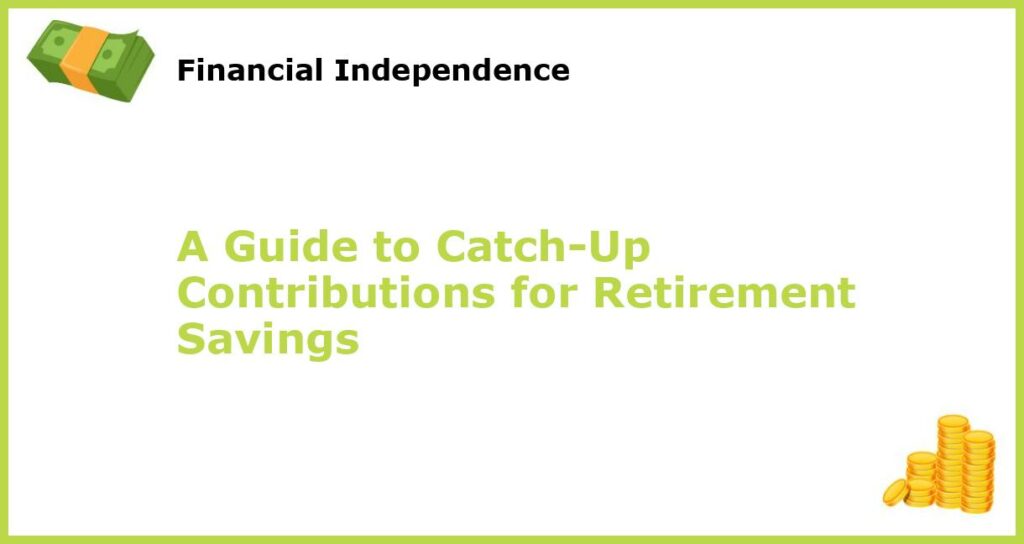Retirement planning is crucial in ensuring that you have enough savings to tide you over during your golden years. While starting early is ideal, catching up on your retirement savings when you are already 50 and above may seem challenging. Fortunately, catch-up contributions can help you bridge the gap and meet your retirement goals. This guide will give you an overview of everything you need to know about catch-up contributions.
What are Catch-Up Contributions?

Catch-up contributions refer to additional contributions that individuals who are 50 years and above can make to their retirement savings account. These contributions are meant to help people who are behind on their retirement savings to catch up before their retirement years.
You can make catch-up contributions to different types of retirement accounts like 401(k), IRA, and 403(b) plans. Catch-up contributions are useful as they enable savers to save more money for their post-retirement life when they have fewer employment opportunities to earn an income.
How Much Can you Contribute as Catch-Up Contributions?

The amount you can contribute as catch-up contributions depends on the type of retirement account you have. For instance, in 2021, the maximum catch-up contribution limit for 401(k), 403(b), and SARSEP plans is $6,500, while for the Simple IRA, it’s $3,000. So, if you fall in this age bracket or are turning 50, you can contribute these extra amounts over and above standard contributions.
Even though these amounts may seem small, they can add up over time, giving people an excellent opportunity to catch up on their retirement goals.
Why Make Catch-Up Contributions?

If you’re nearing your retirement, you might have thought about reasons to save more. The benefits of investing in catch-up contributions are numerous, starting with tax advantages. Retirement accounts like traditional 401(k) and IRA offer tax-deferred contributions, reducing your tax burden to help you save more money.
Catch-up contributions also increase retirement savings, allowing you to achieve your financial goals more quickly. By investing more, you’re helping grow your nest egg, and in turn, increasing your retirement income.
Who Should Make Catch-Up Contributions?

Not everyone should make catch-up contributions. However, individuals who haven’t saved enough for their retirement and are 50 years old or above might consider making catch-up contributions. Also, those who want to maximize their retirement savings should make additional contributions to achieve their financial goals.
When Can You Start Making Catch-Up Contributions?

To start making catch-up contributions, you need to be 50 years or older. However, it’s essential to check if your employer-sponsored retirement plan allows catch-up contributions. Once you confirm, your eligibility to make catch-up contributions begins the year you turn 50.
As long as your employer’s plan allows for catch-up contributions, you can start contributing as soon as you’re eligible.
Benefits of Catch-Up Contributions
The benefits of making catch-up contributions are numerous. It can help you accumulate more savings, increase your retirement income, and take advantage of the tax-advantaged savings that retirement accounts offer. A significant advantage is that catch-up contributions help you close the retirement savings gap, which is essential if you’re behind on your savings.
By making catch-up contributions, you can enjoy your retirement life without worrying about financial difficulties.
Considerations Before Making Catch-Up Contributions
Before opting for catch-up contributions, there are a few crucial factors you should consider. Firstly, think about how these contributions will affect your finances. Generally, catch-up contributions can be a good idea if you have reached other financial goals and have the extra money to invest.
You should also weigh the impact of catch-up contributions on your other retirement goals, such as buying a home or saving for your child’s college education. Consulting with a financial advisor can also help you determine if catch-up contributions are the best option for you.
How to Make Catch-Up Contributions?
You can make catch-up contributions by contacting your plan administrator or completing a catch-up contribution form. If you have an IRA, you can make your regular annual contribution and include your catch-up contribution in it.
It’s essential to check your plan’s rules to ensure that you’re following the right procedures and deadline for contribution. Most plans allow changes once a year during the enrollment period but check with your plan administrator to be sure.
Conclusion
Retirement savings play a vital role in our financial planning goals. Catch-up contributions can be a great way to assure yourself of a comfortable retirement, especially if you’re behind on your savings. These contributions allow you to maximize your retirement savings, take advantage of tax-advantaged savings, and increase your retirement income.
Before opting for catch-up contributions, make sure you consider your overall financial situation by consulting with your financial advisor. You can then go ahead and start making catch-up contributions to start building your retirement savings, even if you’re already 50 or above.







